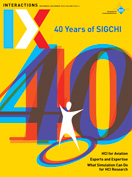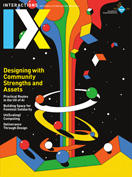Authors: Daniel Rosenberg
Posted: Wed, March 20, 2013 - 10:32:52
In my initial interactions blog post I promised to make my theme the relationship between UX practice and business value.
For the March-April interactions issue, which should be arriving in either your analog or digital mail box about now, I contributed a Forum article describing what I see as a frequently repeated failure to deliver the type and quality of usability data required to make boardroom decisions. I gained this perspective from 18 years in “the boardroom” as a senior executive where I consistently demanded “the right” kind of data to drive HCI strategic investments from my teams.
I won’t attempt to recreate the article here but let me restate the key point as a way of incenting those of you reading this blog who are UX leaders in industry to look at the article and take it seriously. Your long-term success and that of the whole community may hang in the balance.
The basic premise is that the corporate CEO is the most important customer for usability data. Yes, the CEO, not engineering or product management. Not the UX team and certainly not those guys in marketing.
Typically HCI user research is not collected in a fashion that supports longitudinal validity. In fact, the popularity of discount usability methods has all but destroyed the potential for using the usability data to support real business decisions such as to ship or hold a product for additional refinement.
When either lab or field studies are not designed (and documented) properly, the following questions that matter most to the CEO of a product-producing company cannot be addressed.
- Is product A’s user experience improving or declining with this release?
- How does it compare with other similar products we sell?
- Does it cause usability problems if packaged in a suite of applications?
- How does it compare with the competition?
When referring back to something I published, whether recently or decades ago, I try to honestly reflect on what has changed professionally since publication and to assess if I should reconsider my position.
Though this Forum article is hot off the press, I really had not thought about the topic recently until just last night I found myself sitting in the back of the room during a guest lecture on research methods at the university where I am now a professor. I listened to my graduate students debate with the instructor just how precisely they really needed to document their human factors thesis experiments.
My blood pressure rose slightly until I could not resist stepping into the discussion and pointing out to all that this is not an academic question of APA format. The stakes regarding precision in experimental design and execution are likely to be correlated with personal success. In addition, it comes with a responsibility to carry this weight on their shoulders for the reputation of the whole UX profession.
I hope they were listening. From an academic perspective, I can hold them accountable in their thesis projects. Yet, I fear in the real world, pressure will quickly build to take shortcuts the day they step into industry such that the CEO-HCI credibility gap will continue to grow, not contract, and in the long run we will all suffer professionally.
Daniel Rosenberg is Chief Design Officer at rCDOUX LLC
Posted in: on Wed, March 20, 2013 - 10:32:52
Daniel Rosenberg
View All Daniel Rosenberg's Posts






Post Comment
No Comments Found